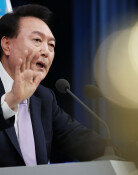[Opinion] Deep In the Soil Beneath Camp Edward
[Opinion] Deep In the Soil Beneath Camp Edward
Posted June. 16, 2007 04:57,
The Philippines once accommodated the largest U.S. air and naval bases in Asia. U.S. forces withdrew from the country in 1992. 15 years have passed. But the country is still suffering from the aftermath. To resuscitate the local economies, the Filipino government designated the areas formerly hosting the bases as special economic zones and granted them diverse privileges, allowing, for example, the establishment of golf courses and duty-free shops. The base areas have not regained their economic strength that they once commanded, however.
But the real problem is not economic. The environmental legacy from the bases is coming back to haunt residents. Wherever the locals dig into the ground for development projects, they discover contaminated soil and hazardous materials such as waste oil or asbestos.
The Filipino government did not pay much attention to the environmental ramifications from the withdrawal 15 years ago. Due to its ignorance, the government did not publicly acknowledge the seriousness. Recognizing the seriousness later, the Filipino government demanded in 2000, when it discovered another case of environmental damage caused by the U.S. forces, that the U.S. government help it cure the damage. But because they had already left the country, Washington denied any responsibility.
Korean lawmakers on the Environmental Committee visited the site of the former U.S. military base Camp Edward. Once the soil was dug up, the odor of oil filled the air, and underground water caught fire when ignited. The U.S. military has announced that they had conducted bioslurping to filter out oil from the groundwater. This year, citing the absence of relevant rules, the U.S. Army rejected the Korean governments requests for an environmental investigation into 5 of the 9 camps that are planned to be returned to Korea.
South Koreans tend to be sensitive to environmental harm caused by the U.S. forces in Korea. The biggest Korean blockbuster film The Host develops in a hypothetical setting where a monster is born due to the environmental harm caused by U.S. forces. On several occasions, the U.S. Army was caught illegally releasing environmentally harmful materials into the rivers, which in turn triggered fierce anti-American sentiment among Koreans. It is undeniable that the U.S. military did sloppy work. At the same time, however, the Korean government is not free from blame. It failed to set forth clear rules and standards to begin with. Now, the relevant procedure is over. Thus, we will have to spend our tax money to clean it up. This fiasco, however, does not grant legitimacy to those who conspire to trigger another anti-American movement among Koreans.
Chung Seong-hee, Editorial writer, shchung@donga.com







